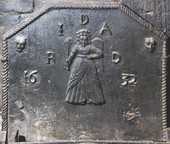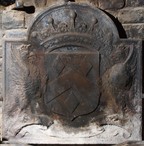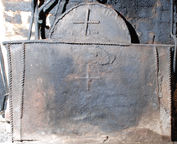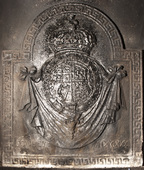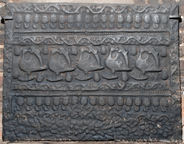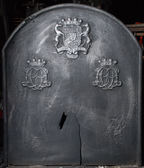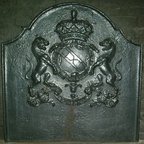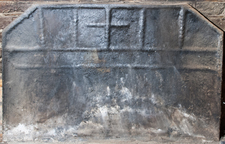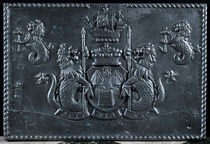-
1027
Description: Canted rectangle; inset twisted rope edging (top and sides); stamp formed of a statuette of an standing angel with left hand at the waist, and holding a sceptre in the right hand; date split either side of angel; initials 'RD' split above date; initials 'IDA' in triad above angel; small face stamp in each top corner.
Notes: The identity of those to whom the initials refer is not known; the use of the angel statuette is a rare inclusion of a religious motif on an English fireback. A variant of this fireback is at Flaxley Abbey, Gloucestershire (no. 293).
Inscription: IDA [triad] / R D / 16 32
- Decoration tags:
- rectangular with canted top corners (shape)
- rope (edging)
- carved stamps
- individual letters
- individual numbers
- text
- humans
Manufactured: in 1632 in the Forest of Dean area of England.
Current location: The Lygon Arms, High Street, Broadway, Worcestershire, England.
- Attached to series:
- Figurine firebacks
- Angel series
-
1029
Description: Arched rectangular shape; cavetto-moulded edging; shield, supporters, earl's coronet and motto scroll.
Notes: The arms are of the Hyde family: azure, a chevron between three lozenges or; the supporters: two eagles, wings endorsed sable, ducally crowned and charged on the breast with a cross or; Edward Hyde (1609-74) was created earl of Clarendon in 1661. An excrescence over the sinister supporter indicates where the iron was poured clumsily into the open sand mould.
Arms: Hyde, earls of Clarendon
- Decoration tags:
- rectangular with round arch (shape)
- cavetto (edging)
- whole carved pattern
- heraldic
- armorial
Manufactured: in the mid- to late-17th century in England.
Current location: The Lygon Arms, High Street, Broadway, Worcestershire, England.
- Attached to series:
- Personal armorial firebacks
-
66
Description: Quasi-arched rectangular shape; twisted rope edging on top and sides of rectangle, and separately around arch; the rope ends extend beyond both ends of the top edge; vertical rope lengths, to full height, inside left and right edges; rope crosses in arch and in upper centre of rectangle.
Notes: Probably an early vernacular example of a design mimicking the ‘Palladian’ style. The crosses suggest Christian significance.
- Decoration tags:
- rectangular with round arch (shape)
- rope (edging)
- simple stamps
- apotropaic
Manufactured: in the mid- to late-16th century in the Weald area of England.
Current location: in private hands, Fernhurst, West Sussex, England.
- Attached to series:
- Rope design firebacks
-
1292
Description: Arched rectangular shape; Greek Key border with fillet edges; in high relief, in front of swagged drapery, the shield of, quarterly, France quartering England, Scotland and Ireland, surrounded by a Garter, and surmounted by a ducal coronet; below, the inscription in capitals.
Notes: The use of the Greek Key design as a border is believed to be unique for an English fireback. Although somewhat indistinct, the use of the Stuart royal arms and the ducal coronet can be explained by the fact that the fireback was one of a group cast for the 2nd Duke of Richmond, whose father, the 1st duke, was the illegitimate son of Charles II and Louise de Kéroualle. The Richmond arms were differenced from the Stuart royal arms by the addition of a bordure compony (the detail of which is not distinct on this casting). Sowley Furnace, near Beaulieu in Hampshire, was owned in 1732 by John, 2nd Duke of Montagu, and was let to Miles Troughton. An identical fireback also at Goodwood is dated 1731 and a similar, but smaller, variant of this fireback, is dated 1732.
Copies of this fireback are known.
Inscription: HONI SOIT QUI MAL Y PENSE / SOWLEY MDCCXXX
Arms: Duke of Richmond
- Decoration tags:
- rectangular with round arch (shape)
- fillet (edging)
- whole carved pattern
- heraldic
- armorial
- royal
- text
Manufactured: in 1730 at Sowley Furnace, Beaulieu in the New Forest area of England.
Current location: Goodwood House, Westhampnett, West Sussex, England.
-
996
Description: Quasi-rectangular shape (42.5mm wider at the bottom); border formed of strips carved with an undulating vine (top and sides); successive rows of repeated stamps: (from top) 18 'hops' or 'grape bunches' in line, horizontal fillet with line of beads below, line of vine strips, 5 birds (probably swans, a Lancastrian badge) in line with 'hops'/'grape bunches' at top and bottom of gaps, line of vine strips, line of beads with horizontal fillet below, 17 'hops'/'grape bunches' in line, and line of vine strips (partially obscured by what appears to be the repeated pressing of finger tips into the casting sand to form an extension at the base).
Notes: One of a series of firebacks incorporating the use of the undulating vine strip, and the 'swan' stamp. Copies of this fireback were advertised in the Wayte & Cheverton (Edenbridge) catalogue in the early-20th century.
Copies of this fireback are known.
- Decoration tags:
- rectangular (shape)
- trailing vine (edging)
- simple stamps
- carved stamps
- heraldic
- animals
- plants
- objects
Manufactured: in the late-16th century possibly at Pounsley Furnace, Framfield in the Weald area of England.
Current location: in private hands, Goudhurst, Kent, England.
- Attached to series:
- Pounsley series
- Vine strip series
- Swan series
- Furniture stamp firebacks
-
392
Description: Arched rectangular shape; cavetto moulding on all sides, with short gaps at each end of the base (possibly to accommodate firedogs); date in top corners; shield, supporters, coronet and motto of the Barony of Bergavenny: Gules, on a saltire argent, a rose of the field, barbed and seeded proper. The motto, ‘Ne vile velis’ (Wish nothing base) is a pun on the family name.
Notes: The arms are those of William Nevill, 16th Baron Bergavenny, of Kidbrooke Park, Forest Row, Sussex. The date of the fireback coincides with the completion of the mansion. Formerly part of the J. H. Every collection.
Copies of this fireback are known.
Inscription: 1736 / NE VILE VELIS
Arms: William Nevill, 16th Baron Bergavenny
- Decoration tags:
- rectangular with round arch (shape)
- cavetto (edging)
- whole carved pattern
- individual numbers
- armorial
- text
Manufactured: in 1736 in the Weald area of England.
Current location: Anne of Cleves House, Southover High Street, Lewes, East Sussex, England.
Museum number: 1944.24.086 (part of the Sussex Archaeological Society museum group)
Citation: Hughes, G. B., 21 Apr 1955, 'Old English Firebacks', Country Life, 117, pp. 1056-60.
- Attached to series:
- Bergavenny firebacks
- Personal armorial firebacks
-
641
Description: Rectangular with arched top; astragal moulded edging (top and sides); top centre, shield, supporters, coronet and motto of the 1st Baron Ashburnham: (1st & 4th) gu. a fess between six mullets ar. (Ashburnham), (2nd) az. semee of fleurs-de-lys a lion rampant guardant ar. (Holland), (3rd) erm. three crescents gu. (Kenn); on an escutcheon of pretence, sa. a chevron between three boys' heads couped at the shoulders proper each entwined around the neck with a snake vert (Vaughan). Supporters: two greyhounds sa. their faces, breasts, and feet ar. collared and lined or; below left and right, a monogram of B and J with a baron’s coronet above.
Notes: John Ashburnham, who married Bridget Vaughan in 1677, was created baron in 1689. he died in 1710. The fireback dates from between 1689 and 1710.
Inscription: LE ROY ET L’ESTAT
Arms: John, 1st Baron Ashburnham
- Decoration tags:
- rounded arched (shape)
- astragal (edging)
- carved stamps
- armorial
- text
Manufactured: in the late-17th to early-18th century probably at Ashburnham Furnace in the Weald area of England.
Current location: Mark Ripley Forge & Fireplaces, Northbridge Street, Robertsbridge, East Sussex, England.
- Attached to series:
- Ashburnham family firebacks
- Personal armorial firebacks
-
687
Description: Rectangular with arched rectangular shaped top joined by cavetto curves; astragal edging; shield, supporters, ducal coronet, motto and garter of the Duke of Dorset: Quarterly, Or and gules, a bend vair.
Notes: Almost certainly the arms of Lionel Sackville KG (1688-1765), created first duke of Dorset in 1720.
Copies of this fireback are known.
Inscription: [around shield] HONY SOIT QUI MAL Y PENSE / [on motto scroll] AUT NUNQUAM TENTES, AUT PERFICE
Arms: Lionel Sackville, 1st Duke of Dorset
- Decoration tags:
- rectangular with canted top corners and round arch (shape)
- astragal (edging)
- carved pattern panels
- armorial
- text
Manufactured: in the early-18th century in the Weald area of England.
Current location: Knole, Sevenoaks, Kent, England.
Museum number: NT/KNO/M/41 (part of the National Trust museum group)
- Attached to series:
- Dorset arms series
- Sackville firebacks
- Personal armorial firebacks
-
1278
Description: Canted rectangular shape; twisted rope edging (top and sides only; two approximately parallel horizontal lines of twisted rope across the upper centre; from the upper line and starting at the top corners, five regularly-spaced vertical lines of twisted rope extending to the top edge, the centre one with a horizontal rope length formiong a cross.
Notes: A simple rope design with apotropaic significance.
- Decoration tags:
- rectangular with canted top corners (shape)
- rope (edging)
- simple stamps
- apotropaic
- objects
Manufactured: in the mid- to late-16th century possibly in the Weald area of England.
Current location: in private hands, Wadhurst, East Sussex, England.
- Attached to series:
- Rope design firebacks
-
1093
Description: Rectangular; simulated twisted rope edging with a gap, top centre; centre, shield, baron's coronet, supporters and crest; in each top corner, heraldic badge - a Sea Lion holding an anchor.
Notes: The arms are of Sir Hudson Ewbanke Kearley, Bt., 1st Baron Devonport (1856-1934); created 1910, he was elevated to Viscount in 1917, thus the fireback would have been cast between 1910 and 1917. Blazon: Azure in chief two Mitres Argent garnished Or and in base a Square Tower of the second, a baronet's badge in chief; Supporters: On either side a Sea Lion Argent crined finned and tufted Or each gorged with a Collar Gules charged with three Roses of the second and each supporting a Spear erect proper; Crest: An Ancient Ship Or the Mainsail Azure charged with a Sea Lion of the first; Motto: Fit Via Vi (The way is made through strength). A version with the same arms and badges has an arched rectangular shape and plain edging.
Inscription: FIT VIA VI
Arms: Hudson Ewbanke Kearley, 1st Baron Devonport (later 1st Viscount)
- Decoration tags:
- rectangular (shape)
- simulated rope (edging)
- heraldic
- armorial
- text
Manufactured: in the early-20th century in England.
Current location:, not known.
- Attached to series:
- Personal armorial firebacks
- Devonport arms series
